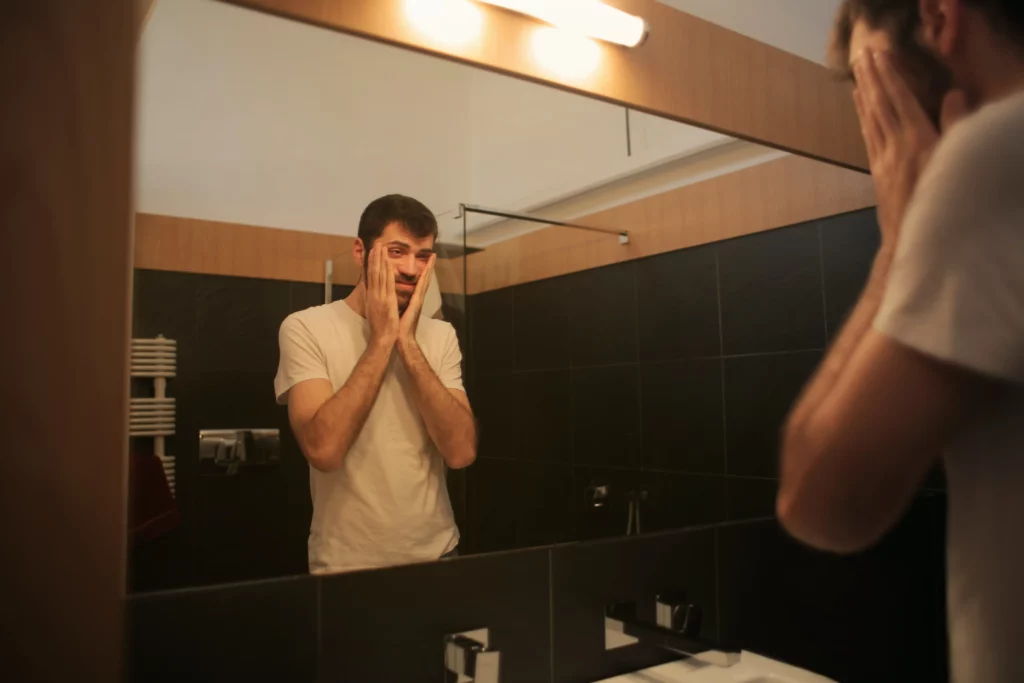As the work week ends and Friday night rolls around, the temptation to escape reality can be overwhelming.
However, it’s important to remember that recreational drug use, while seemingly harmless in small doses, can be dangerous.
Unfortunately, society has normalized and made it more prevalent.
This article takes an honest look at commonly used substances in social settings and leisure activities, such as cannabis, ecstasy, and alcohol.
By outlining their properties and associated risks, we aim to encourage a more informed and cautious approach to recreational drug use and its potential risks, including addiction.
What Are Recreational Drugs?
Have you ever been introduced to the concept of “recreational drugs” at a party or in casual conversation?
Essentially, these substances are used for enjoyment rather than medical reasons.
However, it’s important to remember that many of these substances can profoundly affect the body and mind.
Recreational drug use refers to voluntarily consuming chemicals or compounds that alter the mind and body’s functioning to seek pleasure, relaxation, altered perceptions, or temporary escape from reality.
Unlike medicinal or therapeutic drug use, which is directed by professional guidance to address specific health concerns, recreational drug use occurs outside of a clinical context and is often pursued for its perceived enjoyable effects.
The range of substances considered recreational drugs can include alcohol, cannabis, stimulants, hallucinogens, and more.
Each has the potential to induce varying degrees of euphoria, altered states of consciousness, or sensory experiences.
However, the allure of these effects comes with potential risks and challenges, including the slippery slope towards dependency and negative health, social, and legal consequences.
A Peek Into the Party Bag: Common Recreational Drugs
| Drug | Description |
|---|---|
| Cannabis (Marijuana) | Often smoked or consumed in edibles, it can induce relaxation, heightened sensory perception, and altered time perception. |
| Cocaine | This stimulant can lead to euphoria, heightened energy, and increased alertness. But be wary – its risks are many. |
| Ecstasy (MDMA) | Popular in party scenes, it amplifies sensations, boosts mood, and increases sociability. |
| LSD (Acid) | A hallucinogen, it’s recognized for causing intense trips – altering thoughts, feelings, and perceptions of reality. |
| Mushrooms (Psilocybin) | Just like LSD, these can cause hallucinations, though often they’re more ‘natural’ or ‘earthy’ in their effect. |
| Alcohol | Yes, the drink many toasts with at celebrations also falls into this category. In moderation, it can lead to feelings of relaxation, but excessive consumption can lead to impairment and health risks. |
The Appeal of Recreational Drug Use
As the weekend approaches, many of us may feel the urge to escape from the stresses of modern life.
Some may turn to alcohol or recreational drugs, but have you ever wondered why this is so appealing?
In truth, modern life’s fast-paced and overwhelming nature can lead to burnout and fatigue.1
With work, personal responsibilities, and societal expectations all competing for our attention, it can feel like we’re in a never-ending marathon.
While alcohol or drugs may offer temporary relief, they are not long-term solutions and can exacerbate the problem.
Instead, it’s important to identify the underlying issues and work on finding more sustainable solutions.
One factor that can greatly influence our choices and habits is the people we surround ourselves with and the places we frequent.
Our environment can shape our decisions, so it’s crucial to acknowledge how our social circles and settings can impact us.
Cravings can be difficult to resist, especially when temporarily relieving conditions like anxiety, depression, or chronic stress.
However, relying on drugs or other substances as a coping mechanism can worsen mental health issues in the long run.
Life can throw us curveballs, such as job losses, broken relationships, or personal grief, making recreational use and dependency boundaries blurry.
What started as weekend escapism can quickly become a crutch, leading to addiction.
Movies and TV shows can both reflect and shape society’s behaviors and norms.
Repeated exposure to portrayals of drug or alcohol use as weekend fun can make these behaviors seem normal.
However, the media can offer alternative narratives and promote healthier ways of dealing with stress.
Ultimately, our choices on the weekend are personal, but it’s important to consider if external pressures influence them.
Finding sustainable ways to relax and recharge outside societal norms can lead to genuine joy and connection.

The Health Risks of Recreational Drug Use
When someone engages in recreational drug use, they expose themselves to various short-term and long-term health risks.
Drugs can immediately affect the body and mind in the short term, such as heightened sensations and impaired coordination and judgment.
However, these temporary effects often mask the potential for severe long-term consequences.
Prolonged drug use can lead to various health problems, including cardiovascular and respiratory complications and organ damage.2
Additionally, drugs like cocaine and methamphetamine can trigger anxiety, paranoia, and hallucinations, and long-term use may contribute to chronic mental health disorders.
The risk of addiction is also a concern, as drugs can create powerful dependency cycles that greatly impact an individual’s well-being and quality of life.
To make informed choices and seek help when needed, it’s crucial to understand these complex health risks associated with recreational drug use.
| Risks | Details |
|---|---|
| Short-term effects on the body and mind | Short-term drug use can lead to various effects, including altered perception, impaired coordination, increased heart rate, blood pressure, and disrupted sleep patterns. Different substances can induce euphoria, anxiety, paranoia, hallucinations, or mood swings. The consequences depend on the substance, dosage, individual tolerance, and even the method of ingestion. |
| Long-term health consequences | Continued drug use can lead to serious long-term health risks, such as cardiovascular problems, respiratory damage, and liver or kidney dysfunction. Chronic substance abuse can contribute to various health issues, including lung cancer (in cases of smoking), heart disease, and organ damage. Furthermore, the potential for addiction amplifies with long-term use, making quitting harder and increasing the risk of relapse. |
| Mental health implications and potential for addiction | Many recreational drugs can profoundly impact mental health, leading to conditions like anxiety disorders, depression, and even psychosis. The repeated alteration of brain chemistry can trigger imbalances that persist even after drug use has ceased. Additionally, the euphoric highs experienced during drug use can quickly transition to the chains of addiction as the brain adapts to the presence of the substance, causing withdrawal symptoms and intense cravings. |
Impact on Relationships and Social Life
The impact of recreational drug use ripples through an individual’s life, significantly affecting relationships and social dynamics.
Drug use can strain interpersonal bonds and family relationships at a personal level as erratic behavior, mood swings, and compromised decision-making become commonplace.
Social circles also bear the brunt, as substance use may lead to a growing disconnect from non-drug-using friends due to differing lifestyles and priorities.
This can inadvertently result in social isolation and confine individuals to an echo chamber of like-minded peers.
Additionally, the toll extends to professional or academic spheres, where the cognitive impairment induced by drug use can diminish concentration, productivity, and overall performance.
As the allure of these substances subtly alters priorities and behaviors, addressing the potential strain on relationships, social circles, and life pursuits becomes crucial in comprehending the full scope of the slippery slope of recreational drug use.
Legal Risks and Repercussions
Navigating the world of recreational drugs and the law can be complicated.
Different regions and countries have their own rules and regulations regarding drug use.
Some nations have decriminalized certain drugs for personal use, while others maintain strict policies.
It is crucial to familiarize oneself with the local laws, as just because a drug is legal in one place does not mean it is accepted everywhere.
Failure to do so can result in legal trouble, especially when caught off guard by unfamiliar regulations during a vacation or business trip.
Getting caught with illegal substances or driving under the influence can have severe legal ramifications, including criminal charges, fines, or even imprisonment.
These brushes with the law can create a criminal record that can affect future job prospects, travel plans, and even housing applications.
It is crucial to weigh the momentary high against the potential long-term consequences.
Legal issues can compound the problem for someone already battling addiction.
The stress of court dates, the financial strain of legal fees, and the stigma of a criminal record can intensify feelings of isolation and despair.
For many, this added pressure can worsen substance use, creating a vicious cycle.
Breaking free from this spiral often requires legal assistance and support from mental health and addiction professionals.
Understanding the legal landscape and potential consequences of recreational drug use is paramount.
Avoiding trouble is not the only goal but also safeguarding one’s future, mental health, and overall well-being.

The Biological Mechanism Behind Addiction
The biological mechanism underlying addiction is a complex interplay of neural processes that reshape the brain’s reward and motivation systems.
At the core of this process is the brain’s reward pathway, which involves the release of dopamine—a neurotransmitter associated with pleasure and reinforcement—when pleasurable stimuli are experienced.
The brain’s natural reward system can be hijacked by recreational drugs, particularly those that are highly addictive.
These drugs artificially flood the brain with dopamine, inducing intense feelings of euphoria.
As a result, repeated exposure to these substances causes the brain to adapt chemically to counteract the excessive dopamine release.
This adaptation leads to individuals developing tolerance, requiring higher doses of the substance to achieve the same pleasurable effects.3
The brain’s natural reward system can become desensitized, making finding pleasure in everyday activities harder.
The urge to pursue the drug becomes compulsive as the brain craves the dopamine surge that substance use provides.
Addiction is a challenging and persistent struggle to overcome, as this intricate interaction between brain chemistry and external stimuli underscores the relentless cycle of addiction.
“I Can Quit Whenever I Want To!”
Have you ever been downplaying a behavior you know isn’t healthy?
Maybe you tell yourself that you only indulge in junk food on weekends or that you only shop when you’re stressed.
It’s natural to want to justify our actions and beliefs, but sometimes we can fall into denial.
Saying, “I’m not an addict, I only use on weekends,” can be a way to avoid confronting a growing issue.
This is called cognitive dissonance, where our beliefs and actions conflict.
We try to justify our behavior to find inner peace.
However, believing that “I can quit anytime I want” is also a dangerous trap.
Addiction isn’t just a switch that can be turned on or off.
It’s when control slips away without us realizing it until it’s too late, especially with substances.
Many people start the weekend with a few drinks or occasional substance use as a way to relax and destress.
It may seem harmless fun, and everyone deserves to unwind, right?
However, it’s crucial to understand when weekend fun becomes a necessity.
Addressing the Slippery Slope
We have all experienced or know someone who has made seemingly harmless choices, such as experimenting or indulging occasionally.
However, these decisions can accumulate and become a regular pattern.
Understanding and addressing this progressive slide is crucial to promote safety, awareness, and well-being.
The first step towards addressing this issue is through education.
Knowledge is power, and being informed about the substances you use can aid in making informed choices.
Schools, communities, and online platforms should provide accurate and unbiased information about various drugs’ potential hazards and effects.
The aim is not to scare individuals but to empower them with tools that align with their well-being.
Personal boundaries, such as setting a specific amount or being in a safe environment, can significantly affect outcomes.
There are alternative ways to unwind and have fun without turning to drugs.
Exploring hobbies, physical activities, meditation, or spending time with friends can offer relaxation and escape.
By promoting and encouraging such alternatives, society can shift the narrative towards holistic well-being and genuine, substance-free connections.
Addressing the slippery slope is not about blame or judgment.
It is about offering guidance, understanding, and alternatives and creating an informed and supportive community that empowers and uplifts individuals.
From Recognition to Recovery
Life can often feel like a never-ending whirlwind.
The pressures of society and the allure of escapism blur the lines between weekend adventures and daily struggles.
It’s time to pause and reflect when our weekends seep into our weekdays.
By introspecting about our habits, we can gain self-awareness and identify growing dependencies.
Asking ourselves, “Is my weekend habit starting to dictate my weekday choices?” can be a powerful way to illuminate the shadows cast by addiction.
Recognizing addiction isn’t an admission of defeat but a brave first step toward regaining control.
Addiction can manifest in various ways, such as an ever-present craving, increasing amounts needed to achieve the same effect, or negative impacts on daily life.
Reaching out for help isn’t a sign of weakness but of courage.
Numerous treatment options, such as patient rehab, outpatient therapy, or 12-step programs, are tailored to individual needs.
Support groups like Alcoholics Anonymous or Narcotics Anonymous provide a structured approach to recovery and a community of individuals who understand the journey.
While treatment programs offer structured support, the power of a listening ear or a shoulder to lean on cannot be underestimated.
Friends, family, and fellow recovery members can be essential to healing.
Encourage open dialogues, create safe spaces for sharing, and always remember that recovery is a journey best walked with the company.
The journey from addiction to recovery is deeply personal, filled with challenges, introspection, and growth.
But with the right resources, unwavering support, and an indomitable spirit, it’s a journey that leads to a better, substance-free future.
Reaching out for help can be the most potent weapon against addiction.
Whether it’s therapy, counseling, or attending support groups, sharing concerns and seeking guidance can pave the way for recovery.
These avenues offer strategies, coping mechanisms, and the reassurance that you’re not alone.
Family and friends can be grounding anchors during personal turmoil, providing unconditional support to keep going.
Never underestimate the role of loved ones in recognizing early signs and aiding in the recovery process.

Alternative Ways to Relax and Escape
Amidst life’s chaos, many people seek an escape from work or personal situations.
However, did you know there are healthier and risk-free ways to find relief without resorting to drugs?
Let’s explore some global alternatives that people have embraced for centuries.
One age-old practice is meditation, which involves mindfulness and deep reflection.
Meditation is not just a trend; it has been rooted in ancient cultures for centuries.
By sitting silently and focusing on your breath or a mantra, you can disconnect from external stressors and connect with your inner self.
Meditation has no side effects, only clarity and calm.
Exercise is another healthy and natural way to find relief.
It releases endorphins, which are our body’s natural painkillers and mood boosters.
Whether it’s dancing, jogging, yoga, or any form of physical activity, your body and mind stand to gain.
Exercise not only sculpts your physique but also makes you healthier and happier.
Finally, consider pursuing a hobby or passion project.
Engaging in a fun activity can help you forget your worries and lose track of time.
Who knows?
You may even discover talents you never knew you had!
So, whether it’s dusting off your guitar or picking up a paintbrush, hobbies can bring joy and fulfillment to your life.
Breaking The Cycle
Life can be unpredictable, and sometimes we blur the lines we set for ourselves.
The line between “recreational use” and “addiction” can easily become unclear.
When we enjoy ourselves during the weekends and push through the weekdays, it’s important to remember that choices made during moments of escape can have lasting effects.
Practice self-awareness, appreciate the people and things that ground you, and don’t hesitate to seek help when needed.
Although the temptation of “weekend-only” fun may be strong, a balanced and controlled life is ultimately more fulfilling.
If you or a loved one are facing addiction, please get in touch with us at Cornerstone Healing Center in Scottsdale, AZ.
We are an addiction treatment center that advocates for treating the root cause of the addiction, ensuring long-term recovery and healing.







